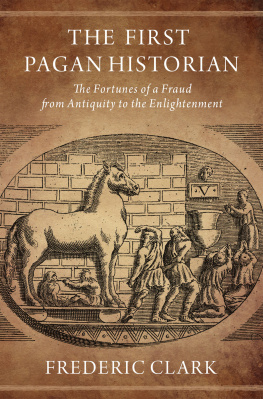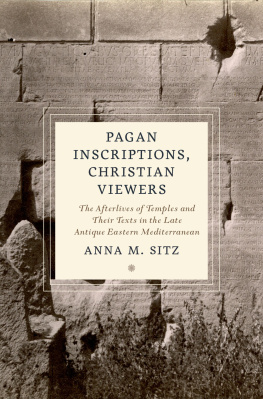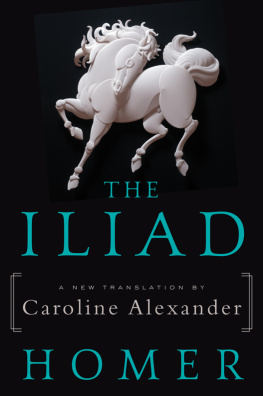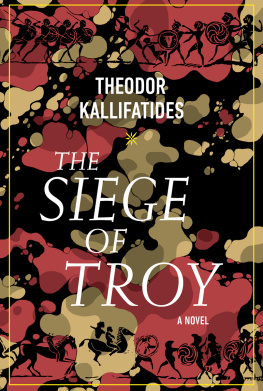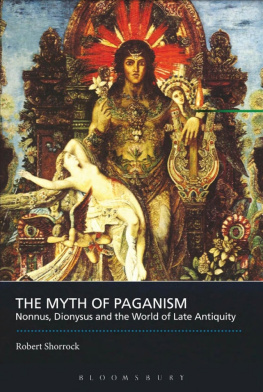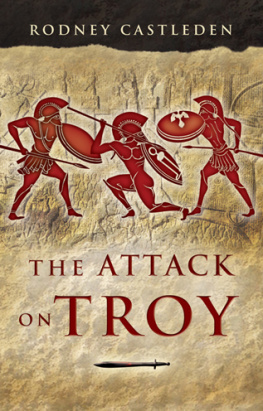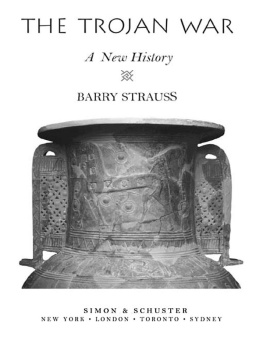The First Pagan Historian

Oxford University Press is a department of the University of Oxford. It furthers the Universitys objective of excellence in research, scholarship, and education by publishing worldwide. Oxford is a registered trade mark of Oxford University Press in the UK and certain other countries.
Published in the United States of America by Oxford University Press
198 Madison Avenue, New York, NY 10016, United States of America.
Frederic Clark 2020
All rights reserved. No part of this publication may be reproduced, stored in a retrieval system, or transmitted, in any form or by any means, without the prior permission in writing of Oxford University Press, or as expressly permitted by law, by license, or under terms agreed with the appropriate reproduction rights organization. Inquiries concerning reproduction outside the scope of the above should be sent to the Rights Department, Oxford University Press, at the address above.
You must not circulate this work in any other form and you must impose this same condition on any acquirer.
Library of Congress Cataloging-in-Publication Data
Names: Clark, Frederic, 1985 author.
Title: The first pagan historian : the fortunes of a fraud from antiquity
to the Enlightenment / Frederic Clark.
Description: New York : Oxford University Press, 2020. |
Includes bibliographical references and index.
Identifiers: LCCN 2020015575 (print) | LCCN 2020015576 (ebook) |
ISBN 9780190492304 (hardback) | ISBN 9780197540725 (epub)
Subjects: LCSH: Dares, Phrygius. | Daretis Phrygii de excidio Troiae
historia. | RomeHistoriography. | Latin philology, Medieval and
modern. | Latin literature, Medieval and modernHistory and criticism.
Classification: LCC PA8310.D353 C535 2020 (print) |
LCC PA8310.D353 (ebook) | DDC 873/.03dc23
LC record available at https://lccn.loc.gov/2020015575
LC ebook record available at https://lccn.loc.gov/2020015576
Contents
For citations of ancient texts, I have followed the abbreviations found in the 4th edition of the Oxford Classical Dictionary. For works without OCD abbreviationsespecially medieval and early modern Latin worksI have included full editorial information and pagination for any modern editions cited.
For transcriptions of material in medieval manuscripts and early modern printed editions, I have left the text as close to the original as possible (e.g., reproducing u or v, i or j as written, and leaving ae as e if rendered thus), although I have expanded all scribal abbreviations. I have also standardized the capitalization of proper names to accord with modern conventions, and have in some cases modernized punctuation to facilitate clearer reading.
While curiously pursuing many studies at Athens, I found the history of Dares Phrygius, written in his own hand as the title indicates...
pseudo-cornelius nepos to pseudo-sallust
the history of modern encounters with the ancientand thus the birth of both classical and historical studies in the form we know those disciplines todayhas often been narrated as a heroic quest for truth and authenticity. Granted, the histories of all disciplines are histories of defining and debating forms of truth. But such issues have proven especially salientand especially thornywhen studying antiquity, whether Greco-Roman or otherwise. After all, antiquity is an object of analysis whose very name signals its alien status: a period of time defined by an almost insurmountable remoteness from its latter-day interpreters. Both the truth about antiquity, and what the ancients considered true, seem very distant, and perhaps very different, from the present.
The modern study of antiquity has often traced its origins to the humanist scholars of early modern Europe. And it is hardly insignificant that early modernity is itself a rather oxymoronic name for a period: the product of twentieth-century attempts to define an epoch imagined as closebut not identicalto modernity. These humanists, who played a leading role in European letters from the Renaissance to the Enlightenment, constantly proclaimed their desire to return ad fontes, to the sources. We should not reflexively dismiss such sentiments as hyperbole. In many cases, through both dogged and creative feats of historical and philological ingenuity, they did get back to these sources. In fact, the very fact that we can even use such ancient texts as sources reflects the achievements of early modern humanistic scholarship. Modern students of antiquity cannot help but stand upon their shoulders. While this book will trace both the triumphs and the blunders of scholars past, humanists included, and will show that certain kinds of errors persisted longer than we might suppose, it is not our task to pass judgment upon their conclusions. Rather, we must recover how our own approaches to debates over truth and authenticity are products of a long history of scholarly engagement withand sometimes misunderstanding ofthe ancient past.
According to many early modern humanists, the cultural products of the Greco-Roman past had been obscured by latter encrustations of text that rendered its authentic originals lost or inaccessible. They dismissed these extra layers as ill-conceived shortcuts, and so they inveighed against commentaries, glosses, epitomes, abridgements, and the like. For instance, they argued that Livy had been nearly lost to time when it became easier to read his epitomizer Florus. Likewise, they bemoaned that the original Aristotle had been swallowed up, engulfed, and adulterated by the glosses of scholastic theologians, rendered in a Latin they dismissed as barbarous. These might strike us as dull or pedantic targets of invectivethe product of academic turf wars whose causes seem remote today. But many of these same scholars also attacked other types of shortcuts to antiquity, which may strike usprovided we have a taste for skullduggery and detective-workas the very opposite of dull. These are what we now refer to under the umbrella term of forgeries, although that term has been applied to many forms of falsehood whose status as forgery is uncertain. Scholars have used the term to describe frauds, fakes, spuria, or other texts that ended up deceiving their readers and receivers, whether or not their original authors intended said deceit. No age has a monopoly on the production, or the acceptance, of such forged texts; nor have we escaped their dangers in the present moment. Such continuities may seem either comforting or sobering. But either way, we are in crowded company: we are heirs to a long history of deceiving and being deceived.
Textual deceptions of this nature couldand still cantake many forms. But one of the most frequent of ruses was the false claim that a text was far older than it really was. The easiest shortcut to antiquity was simply to fake antiquity. If a text did not exist, or existed no longer, one had simply to invent it. This book is the history of one such inventiona Latin text titled De excidio Troiae historia or the History of the Destruction of Troy. It was supposedly written by a certain Dares, a native of Phrygia. This Dares Phrygius claimed to have been an eyewitness to the Trojan War. Since there were no firsthand records of that legendary conflict between Greeks and Trojansa remote event of contested veracity that stood uneasily between myth and history, fact and fictionDares little book filled what seemed a gaping hole in the historical record. We still do not know who the actual author behind the mask of Dares was. And the intentions of this actual author still elude us. Just how literally or earnestly did Dares seek to deceive? Did he lie, full stop? Or did he lie with a wink, with his tongue in his cheek? Even if they sometimes disagreed on these details, beginning in the Renaissance the critics who attacked the

